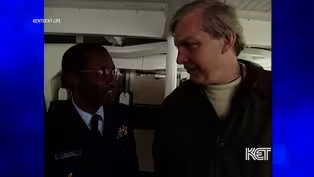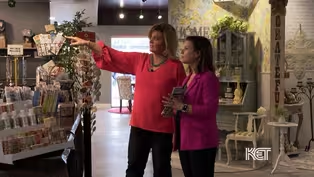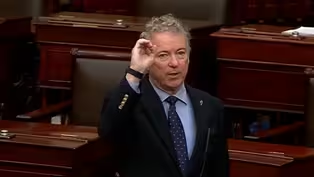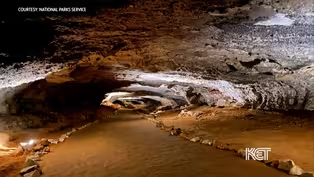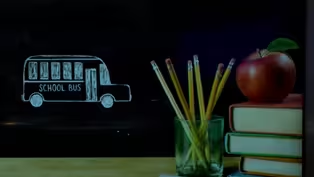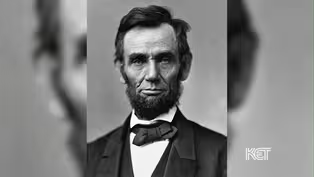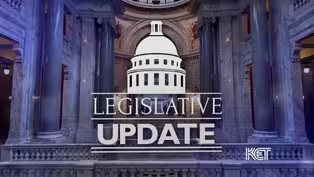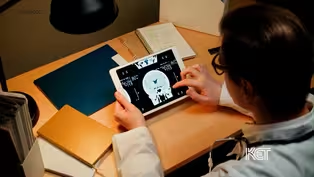
Increasing Access to Food
Clip: Season 2 Episode 182 | 3m 19sVideo has Closed Captions
A non-profit is putting up mini food pantries to help break down barriers.
A non-profit is putting up mini food pantries to help break down barriers and feed those in need.
Problems playing video? | Closed Captioning Feedback
Problems playing video? | Closed Captioning Feedback
Kentucky Edition is a local public television program presented by KET

Increasing Access to Food
Clip: Season 2 Episode 182 | 3m 19sVideo has Closed Captions
A non-profit is putting up mini food pantries to help break down barriers and feed those in need.
Problems playing video? | Closed Captioning Feedback
How to Watch Kentucky Edition
Kentucky Edition is available to stream on pbs.org and the free PBS App, available on iPhone, Apple TV, Android TV, Android smartphones, Amazon Fire TV, Amazon Fire Tablet, Roku, Samsung Smart TV, and Vizio.
Providing Support for PBS.org
Learn Moreabout PBS online sponsorshipFor people in Madison County dealing with food insecurity, getting a free meal has gotten easier.
That's because one nonprofit is putting out many food pantries in the community, all in an effort to break down barriers and feed those in need.
The Appalachian Community Meal and Mutual Aid Project is an effort to help folks reorient with the concept of community through the lens of mutual aid.
We got started when a colleague in the field reached out to money with society, the parent organization which I also co-founded and said, Hey, we want to help.
Where is the help needed?
How can we help you all to meet, you know, some needs?
So, you know, I'm based in Appalachia right now here in Berea, Kentucky.
Food insecurity umbrella seems to be pretty rampant.
It's disappointing to find it is a beautiful and thriving community in some respects.
But just underneath the surface, there are people struggling to survive five day to day and their struggles boil down to housing and food scarcity.
And so today what we do is we try to meet that food scarcity need by serving free meals and also bringing other resources to the table, metaphorically and literally.
What I encounter on a daily basis, a daily basis, is people reaching out to me saying, we need help with dinner.
That's the only meal will eat today if we can just get that my kid doesn't have enough food to eat.
I don't have enough food to eat.
Elderly couples that are on fixed incomes, they're they're rationing their food.
These are all things I've seen with my own eyes.
And it just continues to worsen with the rising cost of living.
The importance of the dry food pantry stems from the fact that a lot of the reason people deal with food scarcity and other types of resource scarcity are barriers to access.
Yeah, the free food pantries are installed here on the street, so you can literally just walk up when you're in need or when you want to share and there's no barriers of access.
So it's a barrier free access point.
So so what that does essentially is it more readily meets meets the need of food scarcity versus having to go through processes and bureaucracy.
The first pantry was installed before the holidays and that kind of kicked off an installation campaign.
So we got I want to say, five installed right before Christmas and New Year's hit.
And we do have plans to install more once the weather warms up and spring rolls back around the locations for the pantries were picked via people who showed interest in hosting a pantry.
It all boiled down to being able to avoid barriers of access.
And by that I mean essentially not having to ask for permission from the city or the state and whatnot.
So land owners, homeowners who had a piece of property that they wanted to host a pantry or on became our prime candidates.
And so through that, we were able to expedite these installations by simply getting the permission from the people who owned the property that they would be installed on.
So the food pantries are a way for us to exercise our power to be there for each other and help each other and exemplify what it is to live an abundant life through sharing.
Smith says other counties are considering dry food pantries.
The Appalachia Community Mill project is working to create a template for others to follow.
Former NPR Host and KY Native Passes Away
Video has Closed Captions
Clip: S2 Ep182 | 44s | Bob Edwards, who hosted NPR's "Morning Edition" for almost 25 years, passed away. (44s)
Kentucky Entrepreneur Puts Taylorsville on the Map
Video has Closed Captions
Clip: S2 Ep182 | 5m 44s | A Kentucky entrepreneur is putting Taylorsville, Kentucky on the map. (5m 44s)
Kentucky's Two U.S. Senators Take Opposite Sides
Video has Closed Captions
Clip: S2 Ep182 | 1m 11s | The division between Kentucky's two Republican U.S. Senators continues to widen. (1m 11s)
New Discoveries Unearthed at Mammoth Cave
Video has Closed Captions
Clip: S2 Ep182 | 2m 25s | New Discoveries Unearthed at Mammoth Cave. (2m 25s)
Search for New Education Commissioner
Video has Closed Captions
Clip: S2 Ep182 | 2m 14s | Friday is the deadline to apply to be Kentucky's next Commissioner of Education. (2m 14s)
This Week In Kentucky History (2/12/2024)
Video has Closed Captions
Clip: S2 Ep182 | 1m 46s | A look at This Week In Kentucky History. (1m 46s)
Video has Closed Captions
Clip: S2 Ep182 | 1m 15s | Senate Bill 143 asks voters to decide if the state constitution should be amended. (1m 15s)
Video has Closed Captions
Clip: S2 Ep182 | 2m 43s | Doctors are using artificial intelligence to make sure valuable time isn't being wasted. (2m 43s)
Providing Support for PBS.org
Learn Moreabout PBS online sponsorship
- News and Public Affairs

Top journalists deliver compelling original analysis of the hour's headlines.

- News and Public Affairs

FRONTLINE is investigative journalism that questions, explains and changes our world.












Support for PBS provided by:
Kentucky Edition is a local public television program presented by KET
